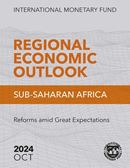This web page provides information on the activities of the Office, views of the IMF staff, and the relations between Guinea and the IMF. Additional information can be found on Guinea and the IMF country page, including official IMF reports and Executive Board documents in English and French that deal with Guinea.
At a Glance
- Current IMF membership: 191 countries
- Guinea joined the Fund in September 28, 1963; Article VIII (obligations of Sections 2, 3,and 4 accepted on November 17, 1995)
- Total Quotas: SDR 214.20 million
- Loans outstanding: RCF loans: SDR 26.78 million; and ECF Arrangements: SDR 152.74 million
- Last Article IV Consultation: The 2021 Article IV consultation staff report was discussed by the Executive Board on June 21, 2021. (Country Report No. 2021/146)
Guinea and the IMF
-
Easing Guinea’s Food Insecurity: The IMF’s Food Shock Window
June 20, 2024
IMF emergency financing has supported Guinea’s efforts to cope with the effects of macroeconomic shocks, underpinned by the authorities’ commitment to transparency in the uses of these funds.
-
Guinea: Technical Assistance Report-Climate Change and Gender Budgeting
May 24, 2024
Series:Technical Assistance Report No. 2024/046
-
May 17, 2024
Series:Technical Assistance Report No. 2024/041
-
May 17, 2024
Series:Country Report No. 2024/130
-
May 17, 2024
Series:Country Report No. 2024/131
Regional Economic Outlook
October 25, 2024
Sub-Saharan African countries are implementing difficult and much needed reforms to restore macroeconomic stability, and while overall imbalances have started to narrow, the picture is varied. Policymakers face three main hurdles. First, regional growth, at a projected 3.6 percent in 2024, is generally subdued and uneven, although it is expected to recover modestly next year to 4.2 percent. Second, financing conditions continue to be tight. Third, the complex interplay of poverty, scarce opportunities, and weak governance--compounded by a higher cost of living and short-term hardships linked to macroeconomic adjustment--are fueling social frustration. Within this environment, policymakers face a difficult balancing act in striving for macroeconomic stability while also working to address development needs and ensure that reforms are socially and politically acceptable. Protecting the most vulnerable from the costs of adjustment and realizing reforms that create sufficient jobs will be critical to mobilize public support.
Read the Report
Fraudulent Scam Emails Using the Name of the IMF
We would like to bring to the notice of the general public that several variants of financial scam letters purporting to be sanctioned by the International Monetary Fund (IMF) or authored by high ranking IMF officials are currently in circulation, and may appear on official letterhead containing the IMF logo. The scam letters instruct potential victims to contact the IMF for issuance of a “Certificate of International Capital Transfer” or other forms of approval, to enable them receives large sums of monies as beneficiaries. The contact e-mail information is always BOGUS and unsuspecting individuals are then requested to send their personal banking details which the scammers utilize for their fraudulent activities.For more information please see Fraudulent Scam Emails Using the Name of the IMF
Departmental Papers on Africa





